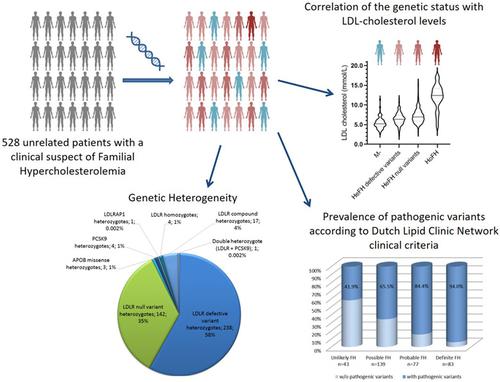当前位置:
X-MOL 学术
›
Clin. Genet.
›
论文详情
Our official English website, www.x-mol.net, welcomes your feedback! (Note: you will need to create a separate account there.)
Genetic spectrum of familial hypercholesterolemia and correlations with clinical expression: Implications for diagnosis improvement
Clinical Genetics ( IF 3.5 ) Pub Date : 2021-07-23 , DOI: 10.1111/cge.14036 Maria Donata Di Taranto 1 , Carola Giacobbe 1 , Daniela Palma 1 , Gabriella Iannuzzo 2 , Marco Gentile 2 , Ilenia Calcaterra 2 , Ornella Guardamagna 3 , Renata Auricchio 4 , Matteo Nicola Dario Di Minno 4 , Giuliana Fortunato 1
Clinical Genetics ( IF 3.5 ) Pub Date : 2021-07-23 , DOI: 10.1111/cge.14036 Maria Donata Di Taranto 1 , Carola Giacobbe 1 , Daniela Palma 1 , Gabriella Iannuzzo 2 , Marco Gentile 2 , Ilenia Calcaterra 2 , Ornella Guardamagna 3 , Renata Auricchio 4 , Matteo Nicola Dario Di Minno 4 , Giuliana Fortunato 1
Affiliation

|
Familial hypercholesterolemia (FH) is the most common genetic disease caused by variants in LDLR, APOB, PCSK9 genes; it is characterized by high levels of LDL-cholesterol and premature cardiovascular disease. We aim to perform a retrospective analysis of a genetically screened population (528 unrelated patients—342 adults and 186 children) to evaluate the biochemical and clinical correlations with the different genetic statuses. Genetic screening was performed by traditional sequencing and some patients were re-analyzed by next-generation-sequencing. Pathogenic variants, mainly missense in the LDLR gene, were identified in 402/528 patients (76.1%), including 4 homozygotes, 17 compound heterozygotes and 1 double heterozygotes. A gradual increase of LDL-cholesterol was observed from patients without pathogenic variants to patients with a defective variant, to patients with a null variant and to patients with two variants. Six variants accounted for 51% of patients; a large variability of LDL-cholesterol was observed among patients carrying the same variant. The frequency of pathogenic variants gradually increased from unlikely FH to definite FH, according to the Dutch Lipid Clinic Network criteria. Genetic diagnosis can help prognostic evaluation of FH patients, discriminating between the different genetic statuses or variant types. Clinical suspicion of FH should be considered even if few symptoms are present or if LDL-cholesterol is only mildly increased.
中文翻译:

家族性高胆固醇血症的遗传谱及其与临床表现的相关性:对诊断改善的意义
家族性高胆固醇血症(FH)是由LDLR、APOB、PCSK9基因变异引起的最常见的遗传病;它的特点是高水平的低密度脂蛋白胆固醇和过早的心血管疾病。我们旨在对经过基因筛查的人群(528 名无关患者——342 名成人和 186 名儿童)进行回顾性分析,以评估与不同遗传状态的生化和临床相关性。遗传筛查通过传统测序进行,部分患者通过二代测序重新分析。致病性变异,主要是LDLR中的错义在 402/528 例患者(76.1%)中鉴定出基因,其中纯合子 4 个,复合杂合子 17 个,双杂合子 1 个。从无致病性变异的患者到有缺陷变异的患者、无变异的患者和有两种变异的患者,观察到 LDL-胆固醇逐渐升高。六种变体占患者的 51%;在携带相同变体的患者中观察到 LDL 胆固醇存在很大差异。根据荷兰脂质临床网络的标准,致病变异的频率从不太可能的 FH 逐渐增加到确定的 FH。基因诊断可以帮助对 FH 患者进行预后评估,区分不同的遗传状态或变异类型。
更新日期:2021-07-23
中文翻译:

家族性高胆固醇血症的遗传谱及其与临床表现的相关性:对诊断改善的意义
家族性高胆固醇血症(FH)是由LDLR、APOB、PCSK9基因变异引起的最常见的遗传病;它的特点是高水平的低密度脂蛋白胆固醇和过早的心血管疾病。我们旨在对经过基因筛查的人群(528 名无关患者——342 名成人和 186 名儿童)进行回顾性分析,以评估与不同遗传状态的生化和临床相关性。遗传筛查通过传统测序进行,部分患者通过二代测序重新分析。致病性变异,主要是LDLR中的错义在 402/528 例患者(76.1%)中鉴定出基因,其中纯合子 4 个,复合杂合子 17 个,双杂合子 1 个。从无致病性变异的患者到有缺陷变异的患者、无变异的患者和有两种变异的患者,观察到 LDL-胆固醇逐渐升高。六种变体占患者的 51%;在携带相同变体的患者中观察到 LDL 胆固醇存在很大差异。根据荷兰脂质临床网络的标准,致病变异的频率从不太可能的 FH 逐渐增加到确定的 FH。基因诊断可以帮助对 FH 患者进行预后评估,区分不同的遗传状态或变异类型。



























 京公网安备 11010802027423号
京公网安备 11010802027423号